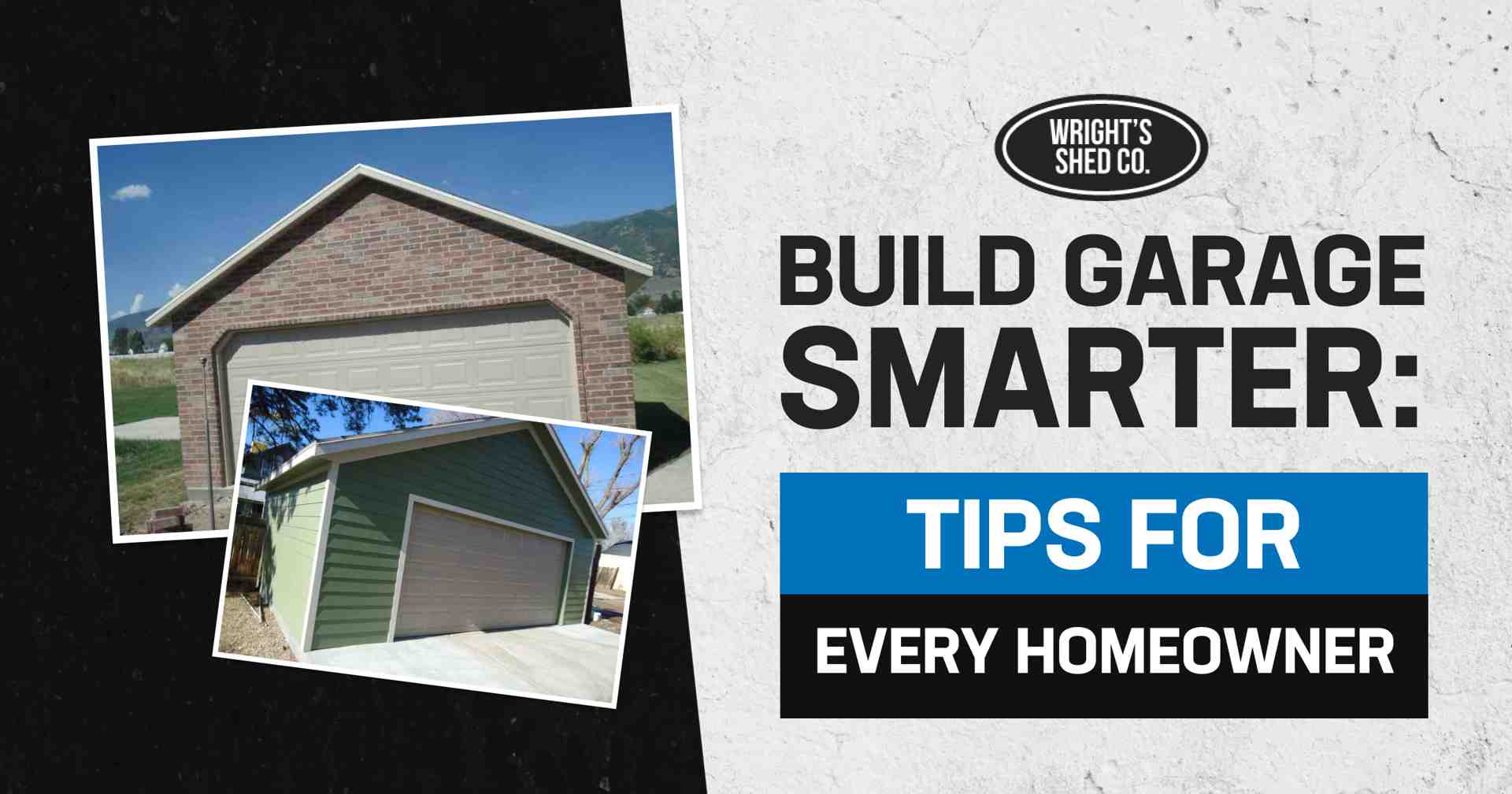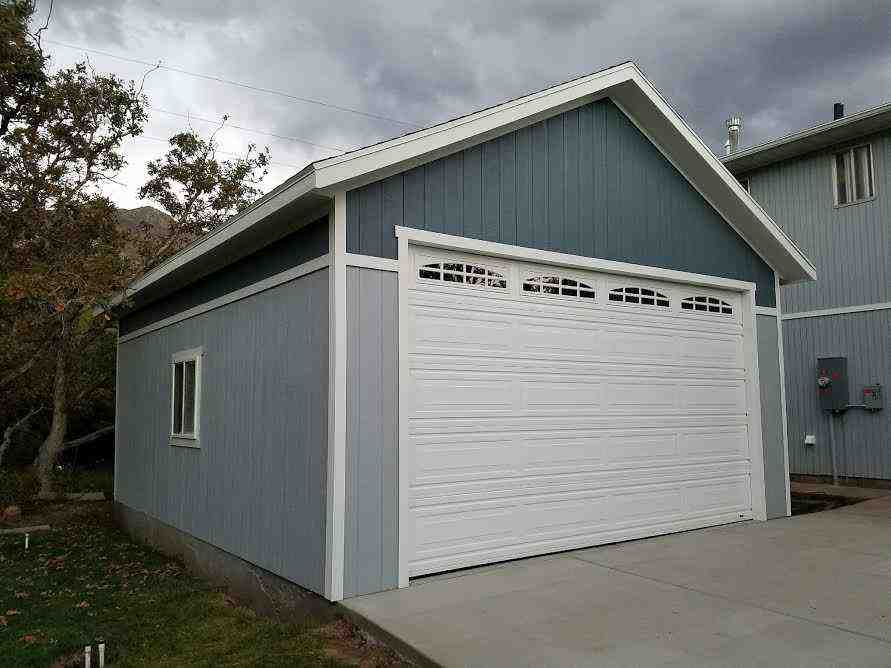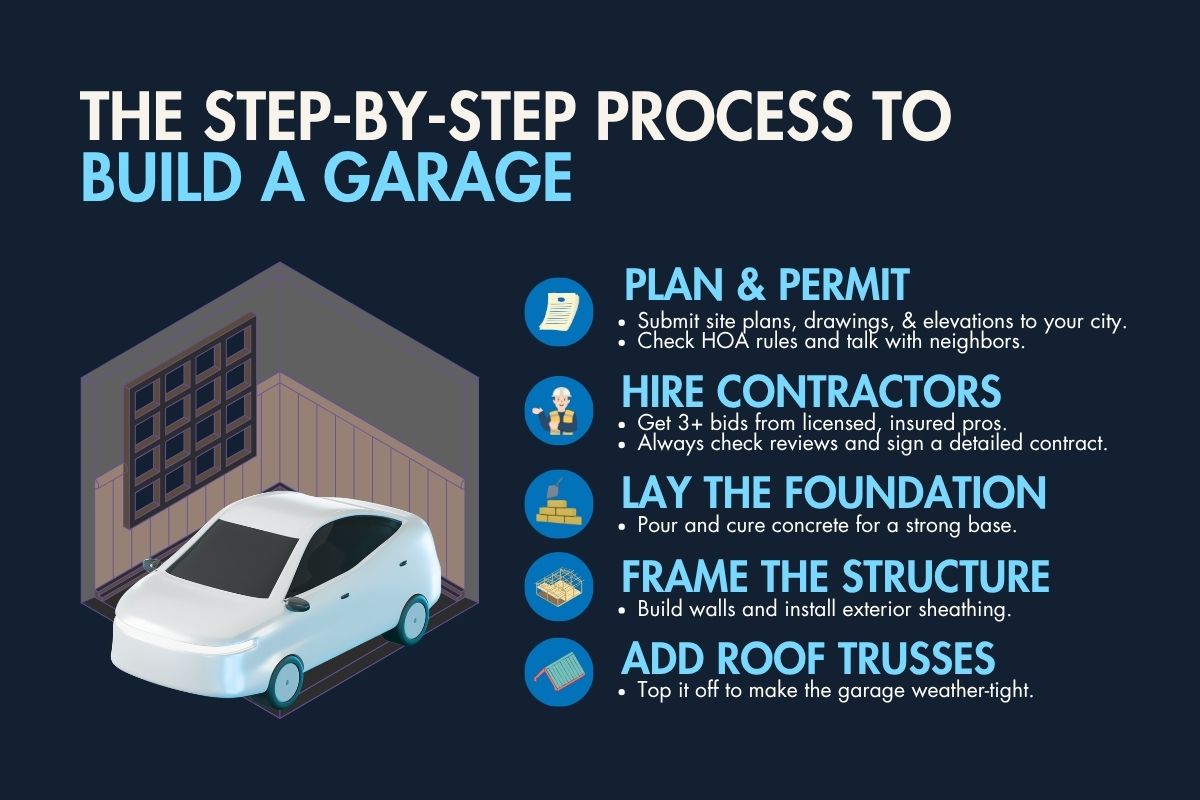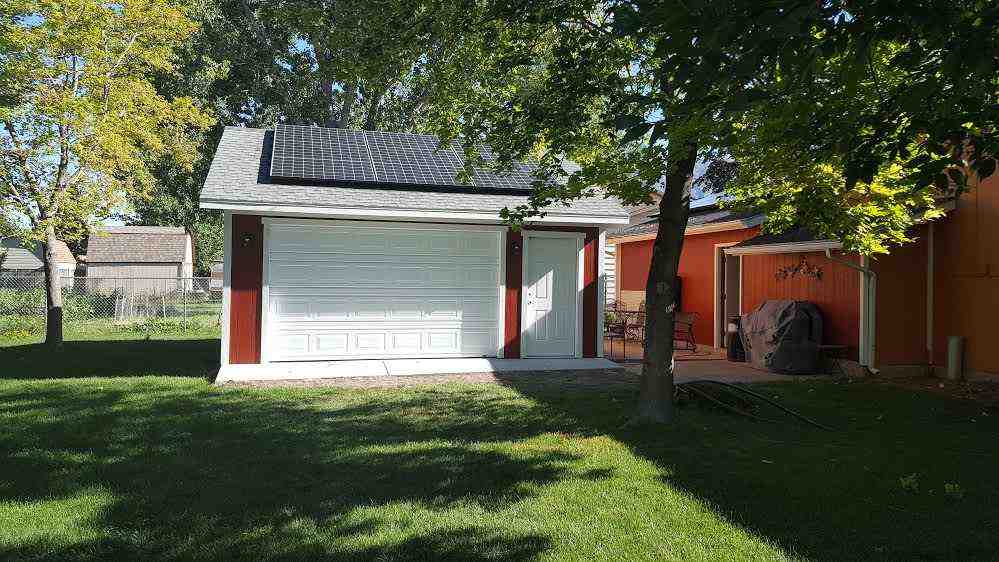Why Every Homeowner Should Build Garage the Smart Way
Build garage projects is among the most valuable home improvements you can make, offering both immediate benefits and long-term return on investment.
Quick Guide to Building a Garage:
- Average Cost: Most custom detached garages cost $40–70 per sq ft, with typical two-car garages averaging around $26,400 total.
- ROI: Detached garages typically deliver 65–75% ROI, while attached garages may reach up to 80%.
- Timeline: Site-built custom garages generally take 4–6 weeks, though prefab options can be assembled in as few as 4–14 hours on-site.
- Permits Required: Yes, in most areas.
- Foundation: Concrete slab is most common.
- Key Benefits: Vehicle protection, storage space, increased home value.
A garage provides far more than just a place to park your car. It offers protection from weather, creates valuable storage space, and can even serve as a workshop or home business location. Research shows that a new garage provides a 65% return on investment and can raise your home’s value significantly.
The average cost to build a garage ranges from $40 to $70 per square foot, with a typical 2-car garage costing $26,400 on average. However, these costs vary based on size, materials, and whether you choose attached or detached construction.
Building a garage involves several key steps: planning and permits, foundation work, framing, roofing, and finishing touches. While some homeowners attempt DIY construction, most benefit from working with experienced contractors who understand local building codes and can ensure quality results.
Planning & Budgeting Your Garage Build
Meticulous planning and budgeting are crucial for a successful garage build. The average cost to build garage structures ranges from $40 to $70 per square foot, highlighting the importance of detailed planning.
A new garage offers an excellent return on investment (ROI), with estimates ranging from 65% to 80%. This means a large portion of your building costs could be recouped when you sell your home, in addition to the immediate benefits of added space and functionality.
Building permits are almost always required. Check with your local city agencies and homeowners associations (HOAs) in Utah, Idaho, Iowa, or Nebraska for specific regulations, zoning laws, and setback requirements. These rules can dictate garage size and materials. Site preparation, including grading and proper drainage, is another critical early step.
A key decision is whether to build garage attached or detached. Detached garages cost about 10% to 15% more, requiring more external walls and separate utility runs. However, a detached garage offers greater design flexibility and placement options. For inspiration, see our Detached Garage Designs to see what’s possible.
Key Cost Factors When You Build a Garage
Understanding what influences garage cost is key to smart budgeting. At Wright’s Shed Co., we offer straightforward pricing based on structure size, materials, and local conditions.
The pricing below reflects current Nebraska garage builds. In Utah, we construct garages during the off-season only, December through March.
Nebraska Garage Pricing (Customer provides foundation and permits)
| Garage Size | Price | Approx. Cost per Sq Ft |
|---|---|---|
| 12×16 | $4,811 | $25.07 |
| 12×20 | $5,166 | $21.53 |
| 12×24 | $5,436 | $18.88 |
| 14×20 | $5,969 | $21.31 |
| 14×24 | $7,167 | $21.38 |
| 16×16 | $7,064 | $27.57 |
| 16×20 | $7,364 | $23.01 |
| 16×24 | $7,764 | $20.18 |
| 18×20 | $6,712 | $18.64 |
| 18×24 | $8,058 | $18.68 |
| 20×20 | $7,196 | $17.99 |
| 20×24 | $8,633 | $17.98 |
| 24×24 | $9,834 | $17.07 |
| 24×30 | $11,989 | $16.65 |
| 24×36 | $14,371 | $16.63 |
Prices above are for structure only. Concrete slab, site prep, and permits must be handled by the customer.
Labor makes up about 30% of the total cost, covering framing, siding, roofing, and finishing.
Material choices play a big role. Wright’s Shed Co. uses:
- LP SmartSide siding with 50-year warranty.
- Architectural shingles included as standard.
- Steel-framed, keyed latch doors.
- Custom upgrade options like windows, lofts, and workbenches.
Your location affects pricing too. Nebraska builds are available most of the year. In Utah, garage builds are only scheduled December to March due to demand and scheduling.
Design complexity adds cost. Simple rectangular layouts with gable roofs are most affordable. Options like added doors, roofline changes, or second-story lofts increase pricing.
While Wright’s constructs the garage, customers must arrange for a concrete slab foundation. These typically cost $5.25 to $8.40 per square foot, depending on lot conditions and local requirements.
Sizing and Dimensions
Choosing the right garage size starts with thinking ahead, how many vehicles you need to store, what tools or equipment you want inside, and whether you’ll use the space for a workshop or extra storage.
Here are the common garage sizes we build at Wright’s Shed Co. in Nebraska:
- 1-Car Garage: Typically 12×20 or 12×24 feet. These sizes provide enough space for one vehicle, with optional room for a workbench or basic shelving.
- 2-Car Garage: Our most popular size. 20×20 or 20×24 feet comfortably fits two vehicles with space to walk around or add side storage.
- 3-Car Garage: Larger families or hobbyists often choose 24×30 or 24×36 feet. This size fits up to three vehicles or two vehicles plus a workshop or storage area.
To ensure functionality:
- Allow 4 to 5 feet of clearance around vehicles for comfortable movement and door access.
- Add space if you plan to include shelves, cabinets, work areas, or tool storage.
Our garage walls are framed with 2×4 or 2×6 studs, with exterior wall thickness typically around 6.5 inches to accommodate sheathing and siding. Interior wall framing, if included, is generally thinner and used for dividing space or future finishing.
If you’re unsure what size is right for your property or lifestyle, check out our Detached Residential Garage Plans to see what’s possible, or contact our team for a custom recommendation based on your goals.
Budget-Conscious Garage Solutions
Building a custom garage doesn’t have to come with a premium price tag. At Wright’s Shed Co., we help Nebraska homeowners create reliable, attractive garages that fit both their space and their budget.
Here are smart ways to build a garage affordably without compromising quality:
- Choose Simple Designs: Rectangular layouts with a standard gable roof are the most budget-friendly. Wright’s standard garage features a 4/12 pitch roof with 12-inch overhangs on all sides, a clean, classic look that balances performance and value.
- Right-Size the Space: Think about your current and future needs for vehicles, tools, or workspace. Every added square foot affects your cost, so size with intention.
- Use Standard Features: Our garages come with cost-saving, high-performance features built in:
- 8-foot walls
- Non-electric garage door
- 3’x3′ window
- Entry door
- LP Smart Panel siding
- Architectural shingles
- Double top plate
- Stick-frame construction
- Finish It Yourself Later: Many customers opt to add shelves, insulation, or paneling after the garage is built. This spreads out expenses and allows you to DIY as time and budget allow.
We also use cost-effective but durable materials in every standard build:
- LP SmartSide Panel Siding: Engineered wood siding that’s pre-primed, impact-resistant, and backed by a 50-year limited warranty.
- Architectural Shingles: Long-lasting and included on every garage at no extra cost.
- Stick-Frame Construction: More solid and versatile than pole barns or prefab kits, built to meet local codes.
- Double Top Plates and Framing with 2×4 or 2×6 Lumber: For long-term stability and strength.
- OSB Sheathing: Used on walls and roof for structural support at a lower cost than plywood.
We don’t just build affordable garages, we build smart ones. See our current garage pricing or contact us for a quote that fits your goals.
The Step-by-Step Process to Build a Garage
With your plans and budget set, it’s time to build. Building a garage is a step-by-step process where each stage is crucial for a strong, long-lasting structure.
First, get your planning and permits in order. This is a requirement. Check your city’s building department website in Utah, Idaho, Iowa, or Nebraska for specific rules. You’ll likely need to submit site plans, foundation drawings, and elevations. Consulting with neighbors and your HOA is also recommended.
Next, consider hiring contractors. Most homeowners hire professionals for parts of the job. Get bids from at least three licensed, insured, and bonded experts. Check their reviews on sites like the Better Business Bureau: Check contractor reviews (Better Business Bureau). Always get a written contract detailing the scope, timeline, and payment schedule.
Once the paperwork is done, building starts with the foundation and concrete. After the foundation cures, framing the walls begins, followed by covering the exterior with sheathing. Finally, the roof trusses go up, making the structure weather-tight.
Finding the right people to help you build garage is key. If you’re looking for experienced builders who care about quality, we invite you to learn more about us. We’ve been building quality garages since 1997. You can find more about Finding the Right Garage Builder for You.
Laying the Foundation
The foundation is the most important part of your garage. A concrete slab is the most popular and budget-friendly choice. This involves pouring a reinforced concrete layer, typically 4 inches thick, onto a prepared base.
Footings requirements are crucial for stability, especially in cold climates. Unless your lot is flat with ideal soil, you’ll need footings, deeper concrete sections that support the garage’s weight.
In cold climates like Idaho, Iowa, and Nebraska, frost line considerations are critical. Footings must extend below the local frost line to prevent shifting and cracking caused by ground freeze and thaw cycles.
Anchor bolts are placed into the wet concrete, usually every 4 feet, to hold the wooden walls firmly to the foundation. They anchor the garage against strong winds.
Finally, allow enough curing time for the concrete. It needs several days (usually around four) to gain strength before wall framing begins. Rushing this step can lead to cracks and structural issues.
Framing, Sheathing, and Roofing
Once your concrete slab is cured, the structure of your garage begins to take shape through stick-frame construction, the method used in all Wright’s Shed Co. garage builds.
We use 2×4 or 2×6 wood framing with double top plates, offering strength and stability that meets or exceeds local building codes. Studs are spaced at 16 inches on center, which provides better support for siding, windows, and insulation compared to wider spacing.
Headers are installed above doors and windows to distribute the roof load and maintain structural integrity. These reinforced beams ensure that openings are strong and long-lasting.
After framing, we install OSB (Oriented Strand Board) sheathing on the walls and roof. This material delivers excellent structural support at a more affordable cost than plywood. Over the sheathing, a house wrap is applied to protect against moisture and wind drafts, laying the foundation for long-term durability.
Wright’s garages include a 4/12 pitch roof with standard trusses. These engineered wood systems are pre-fabricated for fast installation and consistent strength. Every garage also features:
- Architectural asphalt shingles (included in base price)
- 12-inch overhangs on all sides
- Gable-end ventilation (where applicable)
While we don’t install gutters as a standard feature, they are highly recommended to protect your garage foundation. Homeowners typically add aluminum or vinyl gutters after the build, available from local suppliers at $4 to $12 per linear foot, depending on material and style.
At Wright’s Shed Co., we focus on providing durable, weather-resistant exteriors that are ready to last for decades, while leaving room for custom upgrades like metal roofing, additional venting, or extended overhangs.
Customization and Finishing Touches
Once the frame and roof are complete, finishing touches transform the shell into a functional space. Your choices in garage doors, windows and skylights, electrical work, insulation, and interior finishes determine if the garage is just for storage or a valuable extension of your home.
A well-lit, properly wired space with good ventilation makes all the difference, especially for a workshop. Check out our guide on how to Turn Your Garage into a Workshop for more ideas.
Doors, Windows, and Access
At Wright’s Shed Co., every garage includes the essential access points for everyday use, without the extra cost surprises.
Each standard garage comes with:
- A non-electric overhead garage door.
- A steel-framed entry door with keyed lock.
- One 3’x3′ window for natural light and ventilation.
These features are included in the base price and provide a secure, functional entry and exit system for your garage.
If you’re building a larger garage, you may opt for double garage doors or multiple single doors, depending on your layout. While the base model includes a manual door, electric openers and premium door styles can be added by request or installed post-build by a local contractor.
Adding extra windows is a common upgrade to enhance curb appeal and bring in more natural light. Wright’s Shed Co. offers window upgrades in various sizes and placements, custom-built into the structure with proper framing and trim.
For detached garages, your included entry door provides safe and convenient access. If you need a specific door style (like a half-glass, barn-style, or additional side entry), our team can quote those options during your design phase.
We focus on using durable, low-maintenance materials, so your garage stays secure and functional with minimal upkeep. If you’re interested in adding custom windows, doors, or enhanced security features, just ask. Our garage builds are fully customizable.
Electrical, Insulation, and Interior Walls
While Wright’s Shed Co. specializes in the structural construction of detached garages, many customers choose to enhance their space with electrical, insulation, and wall finishes after the build is complete.
Electrical
Wiring your garage adds major functionality, especially if you plan to use the space for tools, storage, or as a workshop. Common additions include:
- Overhead lighting
- GFCI-protected outlets (required by code)
- Garage door opener hookups
- Exterior motion lights or security systems
We recommend hiring a licensed local electrician after your garage is built to handle electrical installations. Wright’s does not include electrical wiring as part of standard garage packages, but we build each structure to easily accommodate future wiring runs.
Insulation
If you plan to heat your garage or use it year-round, insulation is a worthwhile upgrade. Most customers insulate after the build, especially in colder states like Nebraska, Iowa, or Utah (winter months). Make sure to choose the correct R-value for your climate and wall depth (typically framed with 2×4 or 2×6 studs).
Popular insulation choices include:
- Batt or roll fiberglass
- Spray foam for higher performance
- Rigid foam board for ceilings or garage doors
Interior Walls
Wright’s garages are delivered unfinished inside, allowing you to customize the interior to your exact needs. Once insulated, you can finish the space with:
- Drywall, for a clean, paintable surface
- PVC wall paneling, a durable and easy-to-clean option
- OSB, an affordable alternative for workshops or utility-focused garages
Interior finishes can be added right away or over time. We build each garage with framing and sheathing that make future upgrades simple and code-compliant.
Looking for inspiration? Explore our Detached Garage Organization Tips for ideas on how to make the most of your space once the core build is complete.
Advanced Features and Upgrades
At Wright’s Shed Co., we build high-quality detached garages that serve as a strong foundation for whatever you have in mind, whether it’s basic storage, a workshop, or something more custom.
While our standard garage packages include durable, weather-resistant materials and essential access features, many homeowners choose to upgrade or personalize their space after the structure is complete.
Here are a few popular post-build enhancements:
Add Loft or Storage Space
Want overhead storage or even future living space? Our garages can be customized with attic trusses or loft-ready framing, giving you the flexibility to add a storage loft or finish it later as a bonus space (where local zoning allows). Wright’s can incorporate this during your design process.
Workshop Ready Features
Many clients use their garage as a dedicated workshop. After we complete the build, you can enhance your space with:
- Built-in workbenches
- Tool walls and pegboard systems
- Wall-mounted storage or custom shelving
Plumbing & Utility Access
Although Wright’s Shed Co. does not install plumbing, our framing makes it easy to add utility rough-ins for sinks or bathrooms. This is ideal for those planning a hobby space, studio, or future apartment-style conversion.
Be sure to confirm local zoning and permit requirements before planning utility upgrades like:
- Utility sinks
- Bathroom fixtures
- Washer/dryer hookups
Heating and Cooling
For year-round comfort, many homeowners install mini-split systems, electric heaters, or portable air units after construction. Our insulated framing and 8-foot wall height allow plenty of flexibility for ductless or mounted systems.
Custom Storage & Cabinets
If you’re aiming for a garage that feels like an extension of your home, adding custom cabinetry or built-in storage is a great finishing touch. After your garage is built, these features can be added to create a polished, high-functioning workspace.
Start with the right structure, and then tailor it to your lifestyle. Whether you’re dreaming of a workshop, storage loft, or future living space, Wright’s Shed Co. builds garages with future-ready framing to support your long-term plans.
View our garage options and pricing to get started.
Frequently Asked Questions about Building a Garage
Here are answers to some of the most common questions our customers ask when they decide to build garage structures.
How much value does a new garage add to a home?
When you build garage space, you significantly boost your home’s appeal and functionality. A new, high-quality garage offers an impressive return on investment (ROI), typically 65% to 80%. A well-built garage increases market value and curb appeal, signaling convenience and security to buyers. The exact value added depends on your local real estate market and the quality of construction, which is why working with experienced builders is key.
Is it cheaper to build an attached or a detached garage?
Generally, an attached garage is 10-15% cheaper than a detached one. It shares a wall with the house, requiring less exterior construction and offering easier access to utilities. However, the slightly higher cost of a detached garage provides significant benefits. Many find a Detached Garage is Your Best Option for its superior design flexibility and placement options, allowing for more customization for workshops or storage.
What are the ongoing maintenance costs for a garage?
Ongoing maintenance costs for a garage are generally low but essential for its longevity. Routine care includes regular cleaning, inspecting the roof and siding for damage, annual servicing of the garage door and opener, and sealing the concrete floor every few years. These small tasks protect your investment and keep your garage in top condition!
Build Garage Space That Lasts with Wright’s Shed Co.
Building a garage is a smart investment, providing additional storage space, vehicle protection, and a property value boost with a 65-80% ROI. This guide has covered the key steps, from planning to finishing touches. Understanding quality construction and working with professionals are crucial for success.
Since 1997, Wright’s Shed Co. has helped homeowners in Utah, Idaho, Iowa, and Nebraska build their dream garages. Our commitment to quality remains unchanged. We use upgraded materials as standard and back our work with warranties.
When you choose to work with us, you get peace of mind. Our experienced team handles everything from permits and site preparation to the final walkthrough. We understand local building codes and what it takes to create structures that stand the test of time in our climate.
Whether you need a simple single-car garage or a custom three-car structure with a workshop, we’re here to make it happen. Every project starts with understanding your specific needs and budget.
Ready to get started? We’d love to discuss your project and show you what’s possible. View our garage pricing and options to see how we can help you build garage space that perfectly fits your needs.





